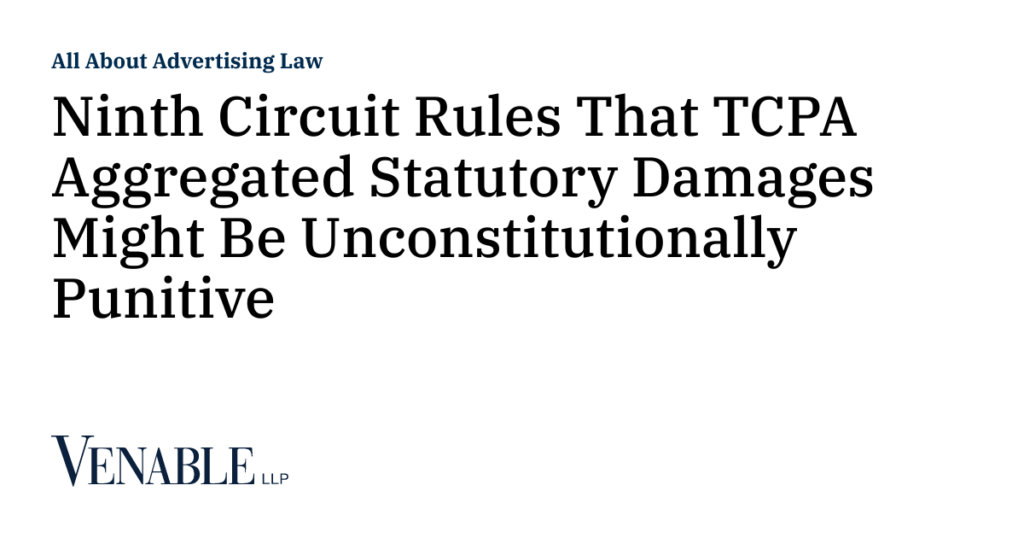Ninth Circuit Guidelines That TCPA Aggregated Statutory Damages Would possibly Be Unconstitutionally Punitive

[ad_1]
For these embroiled in Phone Client Safety Act (TCPA) class motion litigation, the sum of the damages could not essentially equal the entire.
In Wakefield v. ViSalus, Inc., the plaintiff and authorized nationwide class obtained a jury verdict that defendant made 1,850,440 prerecorded message calls with out the then-heightened prior specific consent to make such calls. As a result of the TCPA’s minimal statutory damages are $500 per illegal prerecorded message name, the damages award was a whopping $925,220,000.
After trial, ViSalus challenged, amongst different issues, the damages award as unconstitutionally extreme. Particularly, ViSalus didn’t argue that the TCPA’s $500 per violation statutory penalty is unconstitutional in a vacuum, however, quite, that the “combination award” is so “extreme and oppressive” that it violated ViSalus’s due course of rights. Final Thursday, the Ninth Circuit agreed.
ViSalus primarily relied on St. Louis, I.M. & S. Ry. Co. v. Williams, wherein the U.S. Supreme Courtcautioned {that a} statutory damages award might violate due course of if “the penalty prescribed is so extreme and oppressive as to be wholly disproportioned to the offense and clearly unreasonable.” Below Williams,figuring out whether or not an award is disproportionate and unreasonable requires consideration of the “public curiosity,” “the alternatives for committing the offense,” and deterrence.
The ViSalus court docket utilized the seven components articulated by the Ninth Circuit beforehand in Six (6) Mexican Staff v. Arizona Citrus Growers, to find out whether or not a statutory damages award is, within the combination, disproportionately punitive:
- The quantity of award to every plaintiff
- The overall award
- The character and persistence of the violations
- The extent of the defendant’s culpability
- Harm awards in related instances
- The substantive or technical nature of the violations
- The circumstances of every case
Towards this background, the Ninth Circuit, after rejecting two different arguments regarding standing and retroactive consent, thought-about whether or not the $925,220,000 statutory damages award violated ViSalus’s Fifth Modification due course of rights. The court docket started by noting that “[s]uch constitutional due course of issues are heightened the place, as right here, statutory damages are awarded as a matter of strict legal responsibility when plaintiffs are unable to quantify any precise damages they’ve suffered from receiving the robocalls.”
The court docket then defined that the rationale of Williams was equally relevant to aggregated and per-violation awards as a result of Williams instructions {that a} court docket decide a “common reasonableness and proportionality restrict on damages awarded pursuant to statutes, considering statutory objectives.” To that finish, the court docket continued, “the objectives of a statute in imposing a per-violation award could turn out to be unduly punitive when aggregated,” as a result of “[c]ompensation and deterrence goals might be overshadowed when damages are aggregated, resulting in damages awards which can be largely punitive and untethered to the statute’s function.” When the punitive objectives “overshadow[ ]” the compensation and deterrence objectives, and the punitive award is not cheap or proportional, the court docket defined, constitutional limits are more likely to apply.
The reasonableness and proportionality of a punitive award are essential. The court docket was clear that “simply because an combination award turns into predominantly punitive doesn’t render it constitutionally unsound.” To find out whether or not the award is disproportionately punitive, the court docket remanded to the district court docket to think about the constitutionality of the award in mild of the Six Mexican Staff components.
That the Ninth Circuit held an aggregated TCPA damages award might be unconstitutional is shocking, to the say the least, but it surely appears a nine-digit damages award may cause even the sometimes plaintiff-friendly Ninth Circuit to pause. Nonetheless, it stays to be seen how a lot, if in any respect, the ViSalus award can be lowered, so avoiding such an award continues to be a celebration’s first precedence. An oz of TCPA compliance counseling now would possibly simply save 925 million kilos of ache later.
For extra insights into promoting legislation, bookmark our All About Promoting weblog and subscribe to our month-to-month e-newsletter.
[ad_2]
Source_link








